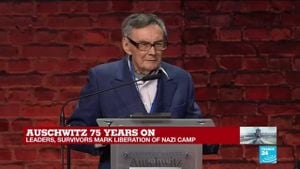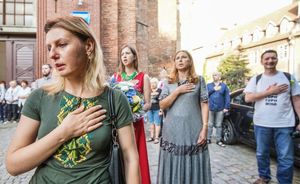The echoes of February 23, 1981, resonate vividly across Spain as the nation remembers the 44th anniversary of the notorious coup attempt known as 23-F. Under the command of Lieutenant Colonel Antonio Tejero, armed civil guards stormed the Congress of Deputies, threatening the fledgling democracy forged just years after Francisco Franco's death. For several tense hours, the future of Spanish democracy hung precariously, teetering on the brink of military rule.
On the night of the coup, Tejero’s chilling shout of "¡Quieto todo el mundo!" (Every man stay still!) captured the nation’s immediate attention. Juan Carlos Rodríguez Ibarra, who was serving as an MP at the time, recalls the terror of those moments, stating, "I thought it was all over for democracy." This moment not only marked the day of the coup but also revealed the resilience and determination of several key figures within the Congress.
Among these figures was the then Prime Minister, Adolfo Suárez, and Santiago Carrillo, leader of the Communist Party. Their refusal to cower under the pressure of armed men became symbolic of Spain's commitment to democracy. General Manuel Gutiérrez Mellado also stood defiantly, gripping the armrest of his seat, as guards aimed their weapons at him. His bravery showcased the valor of those who believed fervently in the cause of democracy, even when faced with imminent danger.
Perfecto Yebra Martul-Ortega, another witness to the events of the coup, later wrote about his experiences as a member of the Union of the Democratic Center (UCD). "It was like watching history unravel; we had only recently established the Constitution, and here we were staring down the barrel of authoritarianism once again," he reflected. His book, 'Si las casas hablasen', delves deeply not only through personal narrative but also historical interpretation of the aftermath of 23-F.
Yet, the decisive turning point came when King Juan Carlos I, who had been tacitly supportive of the military, took to national television. His speech ordered the armed forces to remain loyal to the Constitution, which proved to be instrumental in the failure of the coup. Tejero’s plans were dashed as his supporters began to understand they were fighting against not just political leaders but also against the will of the monarchy. After his speech, Juan Carlos was hailed as the guardian of democracy, solidifying his authority significantly.
Post-coup, Spain entered what many political analysts describe as the 'consolidation phase' of democracy. Alfonso Pinilla, professor of Contemporary History, elaborated on this development: "The 23-F coup was perhaps the catalyst for enhancing the King’s authority and brought about significant changes to the political structure of Spain." The failed coup allowed the country to collectively rally around its democratic institutions, contrasting sharply to the authoritarian regime from which it had just emerged.
While the coup failed, it left behind lessons of political perseverance, as well as reflections on the volatile relationship between military and political powers. The incident prompted discussions on the military's influence within Spanish governance and underscored the importance of safeguarding democracy.
The remembrance of the 23-F coup is not only about examining its historical facts but also about recognizing the bravery of those who resisted oppression when democracy felt most fragile. Many writers and historians continue to explore this pivotal moment, ensuring it remains alive within the annals of Spanish history. Notably, numerous literary works, as cited by historians, have evaluated this day, encapsulating it as both a literary and political turning point.
Books have emerged, analyzing different facets of this attempt including 'Anatomía de un instante' by Javier Cercas and 'El laberinto del 23-F' by Alfonso Pinilla. These contributions help preserve the memories of individuals like Ibarra and Yebra, who experienced firsthand the vulnerability of the democratic framework at the time.
The 23-F coup is now viewed as more than just a significant historical event; it serves as a reminder of Spain’s commitment to democracy, the lessons learned, and the vigilance required to protect it. The day of the coup remains engraved upon the consciousness of the Spanish populace—a stark reminder of their resilience and determination to stand against tyranny.
Each year, as the anniversary approaches, debates resurface about the historical interpretations of the coup, its implication on current Spanish politics, and the role of military sentiment within political discourse. The 23-F not only reshaped the governance but also solidified the narrative of democracy’s fragility and the continual struggle for sovereign governance free from military influence.
The Spanish people's collective memory of the coup will continue to inform future generations about the importance of democracy, resilience, and the price of freedom. From the streets of Madrid to the halls of the Congress, the lessons from 23-F remain integral to Spain's identity, both as to what has been achieved and what could be lost.



